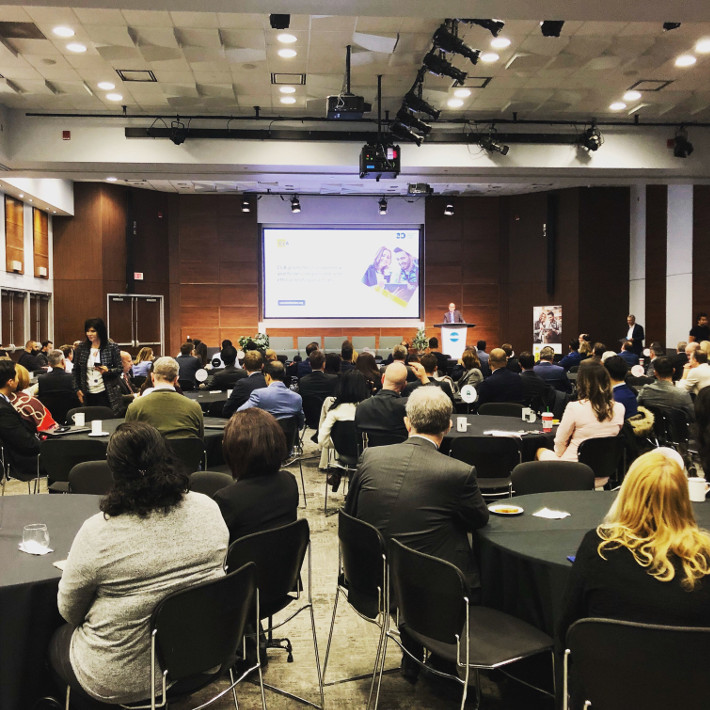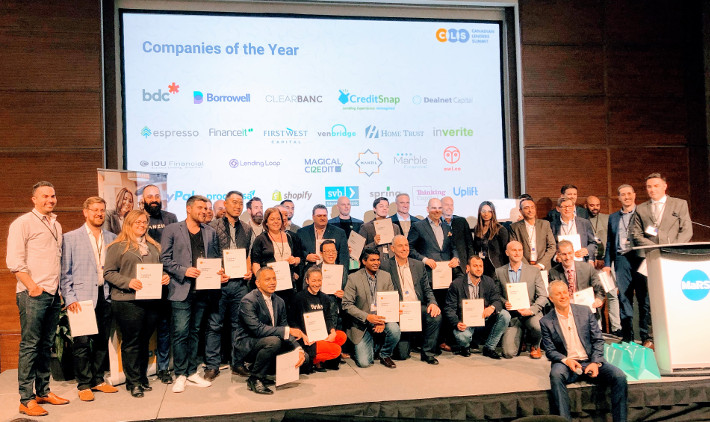Business Lending
The Current State of SME Lending in Canada
December 1, 2019 According to the latest statistics, there were 1.18 million employer businesses in Canada, with the majority of them located in the provinces of Ontario and Quebec.
According to the latest statistics, there were 1.18 million employer businesses in Canada, with the majority of them located in the provinces of Ontario and Quebec.
- 1.15 million (97.9%) represented small businesses
- 21.926 (1.9%) referred to medium-sized ventures
- Only 2.939 (0.2%) accounted for large corporations
Small and medium companies are blooming in Canada: they represent 99.8% of all businesses, and they are the heart of the local economy. However, these businesses are facing extreme challenges when it comes to raising capital – a crucial element of SME growth.
The Canadian banking sphere, dominated by five large banks, often overlooks these businesses. Banks in Canada typically require 32 articles of information when applying for a loan and still 78% of applications from SMEs are rejected. It is especially stressful for startups: you can’t get a loan unless you have customers, but you can’t start your business and get customers without a loan. Cash flow, on the whole, is a complex concept that may be confusing for small business owners, and this kind of financial exclusion only makes it worse. The problem is global, but this Catch-22 has given the green light to alternative lenders worldwide.
THE ALTERNATIVE
One of the alternative funding options for SMEs to bypass the banks and find the right level of capital that they need is called a merchant cash advance (MCA). MCAs aren’t loans. Instead, they represent the sale of a business’s future revenues in exchange for quick cash — the majority of applications are approved within 2 days. This way, a funder provides a lump sum payment with a predetermined percentage (the factor rate) of a merchant’s future credit or debit card sales — cash and check sales typically don’t qualify to be counted. The process goes on until the contractual terms are satisfied. The MCA industry is growing on Canadian soil, but since it is a relatively new domain, the sector remains heavily influenced by American providers, especially when it comes to business models and pricing. But domestic providers don’t see it as a threat. Bruce Marshall, VP of British Columbia-based Company Capital told deBanked in 2016 that “We are happy that some of the bigger US players are coming up here and they are spending millions of dollars on advertising. These companies raise awareness of the industry to a higher level and with us being a smaller company, we can ride on their coattails.”
The question of raising awareness of new technology is vital. In comparison to American SME owners, their Canadian colleagues are slower to adopt technology — for instance, only 27% say they currently use technology to analyze customer data. Another study by BDC claims that only 19% of Canadian businesses are digitally advanced.
On the other side, those established companies find the Canadian alternative lending market to be “a very manageable extension of the US market.” However, it’s a smaller market, and Canada’s geographical position (the majority of businesses are located in four main provinces out of thirteen) and regional differences play their part as well. For instance, because of the restrictions that require businesses to advertise and produce marketing materials in French, the majority of alternative lenders from the US don’t operate in Quebec.
RATES, COSTS, AND FIGURES
All in all, MCAs are slowly becoming a financing option for Canadian SMEs looking for quick cash. That “slowness” comes from a lack of understanding about how exactly merchant cash advances work. Some alternative funders take advantage of their non-bank status to neglect regulations that require clarity resulting in somewhat unethical lending practices. Because of this, a certain number of business owners still hesitate to take a chance on a merchant cash advance program.
MCAs in Canada are generally available to businesses that have a steady volume of credit card sales, such as retail stores or restaurants. The amount of personal and business information required when applying for an MCA is much lower in comparison to a regular bank loan application: the documentation generally includes proof of identity, bank statements, and business tax returns. Merchant cash advance rates and costs differ from provider to provider. As MCAs aren’t loans, there are no fixed amounts for repayment installments and no fixed terms either. Typically, the percentage of credit card sales taken to enable the transaction ranges from 5 to 10%. Some companies in Canada charge premiums on their cash advances (which can be as high as 30% or even more.)
THE CHALLENGE
The main challenge for Canadian MCA providers is the absence of reliable data necessary for making underwriting decisions. As previously mentioned, only a small group of large financial institutions dominate the market, so the data is available solely to a handful of businesses. The information obtained from credit bureaus doesn’t help either: in most cases, it isn’t complete for making a wise credit decision. “The availability and access to government and financial data are scarce in Canada compared to other markets,” said Jeff Mitelman, the former CEO of Thinking Capital in an interview with deBanked in a past interview. “Most of the data relationships that fintech companies rely on, need to be developed on a one-to-one basis and is often proprietary information.”
When it comes to the process of underwriting, the availability of data presented in the proper format is a crucial factor. It provides the full picture and saves an enormous amount of time for risk officers. “We pay a lot of attention to our underwriting and decision-making process because if we make a mistake, we can lose a lot of money,” Andrew D’Souza, the CEO of Clearbanc, told TechCrunch.
At the moment, the financial data available to Canadian alternative lenders is meager and needs improvement. Another issue is the legislation that varies with each province. Many alternative lenders find the Canadian rules and regulations that govern the industry rather unclear. However, those challenges are associated with a growing market and emerging ecosystem. One way or another, the business loan landscape has changed for good, and alternative financing methods have captured much attention, with giants like PayPal stepping in the game.
THE NEXT STEP
As the industry is new, and has lots of challenges, the banking sphere and fintechs are turning to partnerships accelerating online lending to small business members. It makes perfect sense to MCA providers to license their automated platforms, banks, and credit unions. Traditional players are familiar with regulations and have data for fine-tuned underwriting, while fintech providers bring innovative technology and customer experience. “We saw that Canada is ripe for technology but the differences in regulation among other things made us go the partner route,” said Peter Steger, the head of business development at Kabbage, to deBanked – a perfect illustration of the growing partnership trend. These mutual interests create a lot of business opportunities, and that’s a good sign for all parties involved.
When small business owners need financing, timing is essential. Small and medium businesses are vital to the Canadian economy, so for them, the proper financial support means fast and convenient access to credit. In the new fintech-driven reality, applications should be completed within thirty minutes, decisions made within hours, and funds deposited in the applicant’s bank account within days. Canadian small businesses contribute around 30% of the total GDP, so the need for simple finance is acute. The technology has already made small business lending more accessible, and over time, financing alternatives such as MCA will become mainstream.
Broker Fair / Black Friday ONE-DAY ONLY Special Price
November 28, 2019Broker Fair Returns to New York City on May 18, 2020. Take advantage of this special ONE-DAY only discount code and get 29% OFF THE EARLY BIRD PRICE. This incredible deal ends at 11:59pm EST on 11/29/19.
Broker Fair’s two previous annual events sold out in advance. Hundreds of brokers from the commercial financing, merchant cash advance, and small business lending industries will be in attendance this year. See you at Broker Fair!

Flender Makes BIG Mark in Ireland’s SME Lending Market
November 26, 2019 Ireland can seem like a small place, so much so that on my way to meeting with Colin Canny, Flender’s Head of Partnerships, I quite literally bumped into Flender’s co-founder & CEO Kristjan Koik who was walking through Dublin’s Silicon Docks. I recognized Koik from the who’s who catalogue of executives I had compiled before traveling abroad to explore the Irish fintech scene. He was cordial and polite. And yet through his demeanor I sensed there was more, that there was a story to be told even if it was not ready to be shared.
Ireland can seem like a small place, so much so that on my way to meeting with Colin Canny, Flender’s Head of Partnerships, I quite literally bumped into Flender’s co-founder & CEO Kristjan Koik who was walking through Dublin’s Silicon Docks. I recognized Koik from the who’s who catalogue of executives I had compiled before traveling abroad to explore the Irish fintech scene. He was cordial and polite. And yet through his demeanor I sensed there was more, that there was a story to be told even if it was not ready to be shared.
The following month Flender would reveal remarkable news, a new €75 million funding line, bringing their total to €109 million raised since the company’s founding in 2015. The company is backed by Eiffel Investment Group, Enterprise Ireland, entrepreneur Mark Roden and former Ireland rugby player Jamie Heaslip.
This large amount of funding, even by UK or US standards, makes Flender stand out, and so when I finally meet with Canny on that warm Fall day in September, I’m pretty thankful he afforded me the time.
Flender, Canny explains, is derived from Flexible Lender. The pamphlet he produces and hands to me says that their idea is simple, to provide businesses with the funding they need and ensure the application process is fast, easy, and transparent.
Application details for products like term loans and merchant cash advances require the usual stips like historical bank statements, a profit & loss statement, and a balance sheet. But there’s also a section quintessentially Irish, that is that it can be beneficial to submit your last 2 years herd numbers if you’re a farmer, complete with your last 12 months Milk Reports and property acreage figure.
 Canny explains that Flender is not a high-risk fall-back lender, but rather the opposite. “Our credit process is extremely tight,” he says, “in line with banks.” And with good rationale, seeing that the company is still somewhat reliant on a peer-to-peer funding model. More than half of individual peers on the platform are Irish but Canny says that it’s not unusual for non-residents including Americans to lend on the platform as well.
Canny explains that Flender is not a high-risk fall-back lender, but rather the opposite. “Our credit process is extremely tight,” he says, “in line with banks.” And with good rationale, seeing that the company is still somewhat reliant on a peer-to-peer funding model. More than half of individual peers on the platform are Irish but Canny says that it’s not unusual for non-residents including Americans to lend on the platform as well.
Canny says the Irish market is very “community based.” The transparency of the marketplace aligns with that characterization. Like other peer-to-peer small business lenders in Ireland, borrower identity is publicly accessible on the platform, as are the terms of the loan. Anyone can view the business name of a prospective borrower on the website, the address, a bio, and even their “story.”
Flender taps several marketing channels like Google Adwords, radio, direct sales, and even brokers. Canny says they generate an underwriting decision in as quick as 4-6 hours and fund a business in as little as 24 hours. Borrowers like the product so much that many renew. Seventy percent of the SMEs in the country are peer-to-peer bankable, Canny explains, creating a wide playing field to target.
Meawnwhile, CEO Kristjan Koik told the Irish Times that the top 3 banks in Ireland have 92 percent of the SME lending marketshare so there is still a ton of opportunity for non-banks like Flender to grab hold of.
As for how the massive credit line impacts them going forward? Koik told the Times that they would be cutting interest rates by up to 1 percent across their various loan products. Interest rates now start as low as 6.45% and terms range up to 36 months.
As Canny and I part ways I present one final question, will Flender be expanding abroad? I get no definitive answer. He was cordial and polite, and yet I sensed through his demeanor that there was more, perhaps even a story in the works that was not yet ready to be shared.
Canadian Lenders Summit Recap
November 23, 2019 The Canadian Lenders Association’s largest annual event brought together hundreds of executives from the fintech and lending industries. It was hosted at MaRS, a dedicated launchpad for startups in Downtown Toronto that occupies more than 1.5 million square feet and is home to more than 120 tenants, many of which are global tech companies.
The Canadian Lenders Association’s largest annual event brought together hundreds of executives from the fintech and lending industries. It was hosted at MaRS, a dedicated launchpad for startups in Downtown Toronto that occupies more than 1.5 million square feet and is home to more than 120 tenants, many of which are global tech companies.
After OnDeck Canada CEO Neil Wechsler was introduced as the new chairman of the association, the day kicked off with a presentation by Craig Alexander, the Chief Economist of Deloitte Canada. Alexander explained that after some major warning signs sounded off late last year and early this year, Canadian growth and positive economic indicators have returned. He opined that politics in Canada and the United States will play a strong role in the economic outcomes of both countries going forward.
Panels on a variety of topics dominated the rest of the day with an interlude keynote from author Alex Tapscott who spoke about the financial services revolution.
The sessions concluded with an award ceremony focused around the Top 25 Company Leaders in Lending and the Top 25 Executive Leaders in Lending. The Canadian Lenders Association will make videos of the sessions available online. deBanked was in attendance.

IOU Financial Originated $41.4M in Loans in Q3, Continued Profitability
November 14, 2019IOU Financial originated $41.4M in business loans in Q3, according to the company’s latest published financial statements. The figure is a modest increase over Q2’s $38.5M. IOU also kept up its trend of profitability with net income $1M.
Shares of IOU, which trade on the Toronto Stock Exchange, are valued at around (CAD) 14 cents and equate to a market cap of approximately (CAD) $14M.
Costs, Losses Soar At StreetShares
November 12, 2019 StreetShares increased revenue by nearly 40% year-over-year, according to the company’s latest fiscal year 2019 filing, but costs soared and increased by almost 90%.
StreetShares increased revenue by nearly 40% year-over-year, according to the company’s latest fiscal year 2019 filing, but costs soared and increased by almost 90%.
StreetShares reported a staggering $12.3M loss on only $4.4M in revenue. That loss was much wider than the previous year’s loss of $6.5M on $3.2M in revenue.
Whereas startups may spend heavily on sales and marketing as they prioritize growth and scale, StreetShares’ primary cost, as in prior years, continues to be payroll. The company spent approximately $7 million in payroll and payroll taxes in fiscal year 2019.
The margin by which payroll exceeds revenue is increasing (157% in FY ’19 vs 144% in FY ’18). For comparison purposes, payroll expense makes up less than 25% of revenue for StreetShares rival IOU Financial.
StreetShares’ source of funds has shifted away from institutional investors and professional investors to retail investors. Retail investors only provided 43.89% of funds in FY ’18 but provided 86.72% of funds in FY ’19.
Retail investors, permissible under Regulation A, do not invest in individual loans but rather they lend money to StreetShares for which the company can use for lending or for “general corporate purposes” or “other products at the discretion of the company.” In return retail investors receive a fixed 5% annual return.
As of May 2019, the company reported that 80% of funds they lend out go to US veteran small businesses. A veteran small business is defined as “a company that is at least 25% owned by a veteran or military spouse or has a veteran or military spouse as the co-guarantor.”
Factoring for Freelancers
November 8, 2019 The number of freelancers in America is quickly growing year on year, with a recent study indicating the percentage of full-time freelancers has increased from 17% of the workforce in 2014 to 28% in 2019. Representing a host of fields, from writing and photography to marketing and programming, the incomes and needs of such workers vary as much as their roles do, however a commonality between them is their difficulties with financing.
The number of freelancers in America is quickly growing year on year, with a recent study indicating the percentage of full-time freelancers has increased from 17% of the workforce in 2014 to 28% in 2019. Representing a host of fields, from writing and photography to marketing and programming, the incomes and needs of such workers vary as much as their roles do, however a commonality between them is their difficulties with financing.
Being infamous for the difficulties involved in getting paid, freelancers have historically had trouble with the timings of payments. With 59% of freelancers reporting that they live pay check to pay check, missing a payment or waiting until an untimely employer responds to an invoice may not be possible for many; and beyond payments, banks have yet to catch up with the needs of freelancers.
“There’s this great big area in between consumer banking and business banking that freelancers fall into and the big banks aren’t dealing with that,” George Kurtyka of Joust explained. “They have strategies but it’s not really something they know how to do.”
Kurtyka, after a period of jumping between phone services, payments, and the fintech end of banking, is now COO and Co-founder of Joust, a financial services company occupied with providing for those freelancers ill-suited to traditional banking, which has been operating since 2017.
How are they going about it? Following a conversation Kurtyka had with a friend who told him over half of freelancers don’t separate their business and personal finances, he figured the best place to start was with bank accounts, which became the first product available from Joust. Next was the issue of non-payment, a problem his team thought was suited to underwriting. Offering guaranteed payment within 30 days for 1% of the invoice or instant payment for 6%, factoring, via its PayArmour product has become a large part of Joust’s business model.
“It feels almost like an insurance product,” Kurtyka observed. “When you send an invoice, we’re doing risk assessment on you, we’ve onboarded you and given you a bank account so we know about you.”
And so, after an early partnership with the Freelancers Union, Joust has been offering its cocktail of banking, invoicing, and alternative financing services to freelancers and self-owned businesspeople across America, with eyes on expanding its products further down the line.
“As you can imagine, we can start with just invoice factoring, but we can move into working capital and lines of credit … We’ve heard stories of freelancers losing houses and apartments because they were paid late. The next step is income smoothing. If you can predict how much you’re going to earn, we can smooth your income and then work with one of our bank partners to prequalify you for a loan. We’re obviously not a chartered institution but we work with a host of chartered banks and payments companies and we sit on top of them and the great news is we work with a lot of partners who want access to this burgeoning market of freelancers who may not qualify for a FICO score because their income is like this … Down the line we’d love to offer loans and mortgages. We think the underwriting models we’re building could be like the next FICOs for freelancers.”
Selecting a Third-Party Commercial Collection Agency
November 8, 2019 It’s said that anyone can lend money out but the hard part is getting paid back. The latter part is full of nuance, a 32-page white paper authored by Minnesota-based Dedicated Commercial Recovery (Dedicated) reveals.
It’s said that anyone can lend money out but the hard part is getting paid back. The latter part is full of nuance, a 32-page white paper authored by Minnesota-based Dedicated Commercial Recovery (Dedicated) reveals.
“Choosing a third-party commercial collection agency is a matter of comparing potential returns and risks in order to achieve an optimal balance of both,” the report opines. “The purpose of this paper is to present one possible outline for making such a balanced choice.”
While it may be views that Dedicated espouses, the report stops short of self-promotion while raising valuable questions that anybody contracting with a commercial collection agency would benefit from considering. After all, even if third-party collections inherently suggests that relations between the original parties have broken down, the collections experience can set the final tone on how a customer feels about your brand.
That’s just the tip of the iceberg, according to the report. The collections process can have legal implications, present operational challenges, and ultimately impact the efficient orderly flow of business.






























